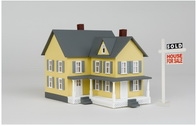Advertisement
NAR finds pending home sales surge continues

Pending home sales have risen for three consecutive months, reflecting the broad impact of the first-time homebuyer tax credit and favorable housing affordability conditions, according to the National Association of Realtors (NAR). The Pending Home Sales Index (PHSI), a forward-looking indicator, rose six percent to 110.9 based on contracts signed in April, from an upwardly revised 104.6 in March, and is 22.4 percent higher than April 2009 when it was 90.6. That follows gains of 7.1 percent in March and 8.3 percent in February.
Pending home sales are at the highest level since last October when the index reached 112.4 and first-time buyers were rushing to beat the initial deadline for the tax credit. The data reflects contracts and not closings, which usually occur with a lag time of one or two months.
“There were concerns that only a small pool of buyers were left to take advantage of the tax credit extension," said Lawrence Yun, NAR chief economist. "But evidently the tax stimulus, combined with improved consumer confidence and low mortgage interest rates, are contributing to surging sales. The housing market has to get back on its own feet and now appears to be in a good position to return to sustainable levels even without government stimulus, provided the economy continues to add jobs.”
NAR expects a net of one million additional jobs in the second half of this year and about two million in 2011.
“The homebuyer tax credit brought close to one million additional buyers into the market, which is now helping the trade-up market and has significantly improved the inventory situation," said Yun. "This stabilized home prices more quickly and has preserved about $900 billion in home equity; in turn, that is keeping additional households from going underwater and risking foreclosure."
The PHSI in the Northeast jumped 29.5 percent to 97.9 in April and is 24.5 percent above a year ago. In the Midwest the index rose 4.1 percent to 104.2 and is 17.9 percent above April 2009. Pending home sales in the South slipped 0.6 percent to an index of 123.9, but is 31.3 percent higher than a year ago. In the West the index rose 7.5 percent to 107.9 and is 12.0 percent higher than April 2009.
“A big concern surfacing recently is insufficient time to close the deal at the settlement table. Under normal circumstances, two months would be enough time from contract signing to settlement date,” Yun said. “However, the recent housing cycle has brought long delays related to the short sales approval process by banks, and from ongoing appraisal issues. There could be a sizable number of homebuyers who responded to tax credit incentives, but may encounter problems meeting the settlement deadline by June 30.”
Because of these market challenges, NAR has asked Congress to provide flexibility on the deadline for closing.
For more information, visit www.realtor.org.
About the author





